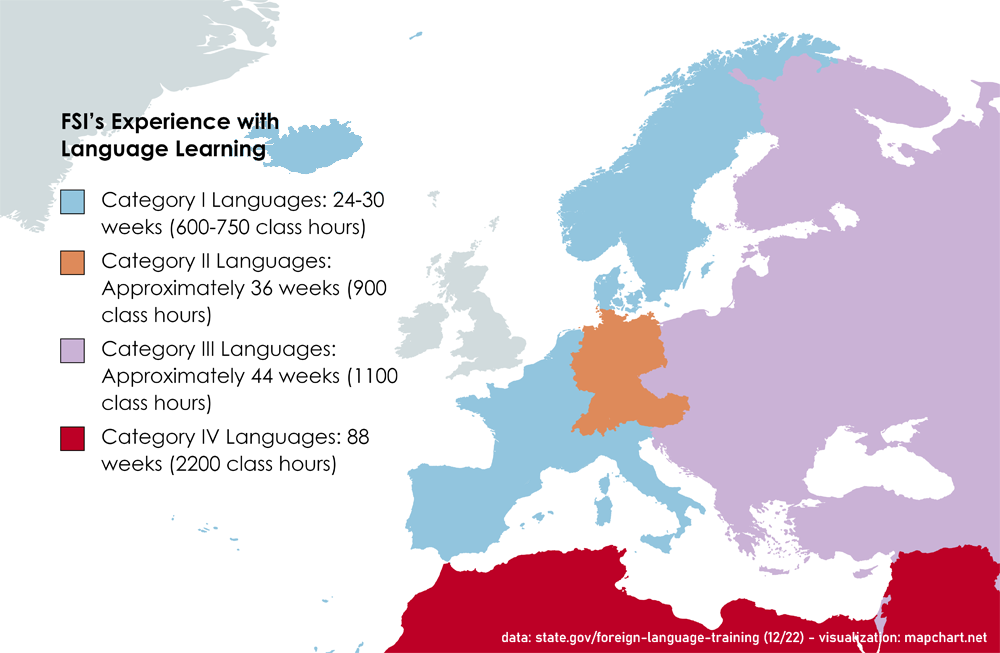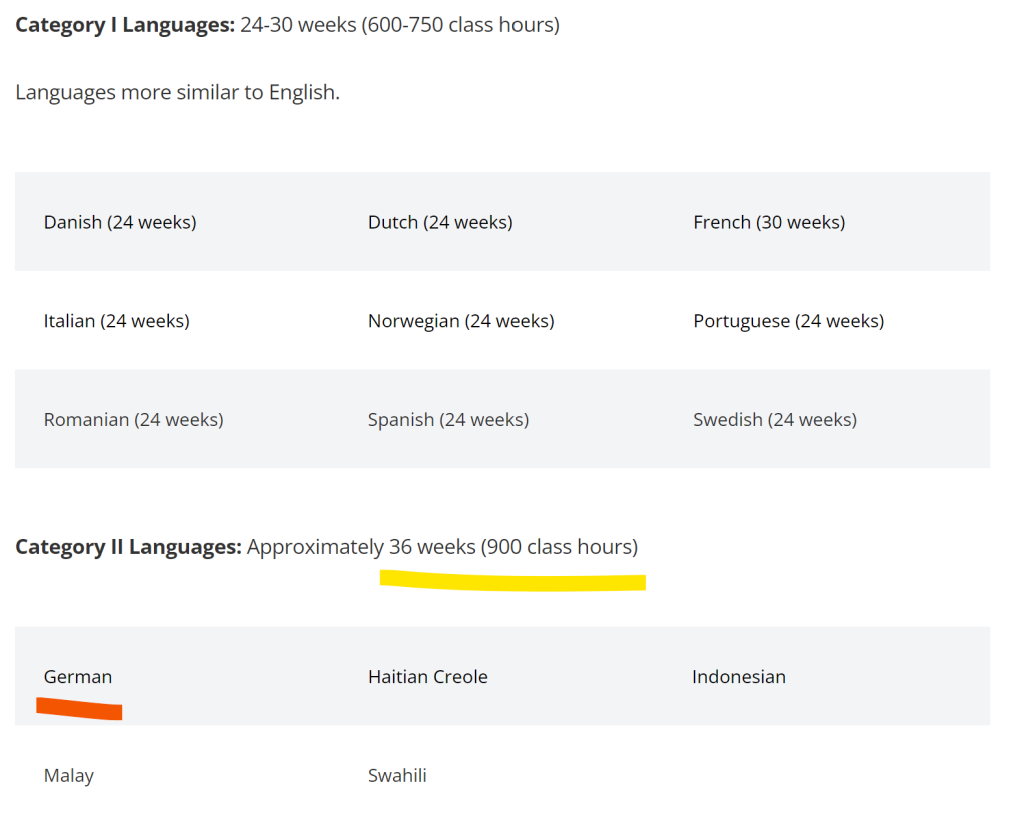
Imagine yourself diving headfirst into the linguistic ocean that is the German language. You’ve heard tales of its turbulent grammar, a treasure trove of compound words, and the promise of cultural riches that lie beneath the surface.
It’s no wonder you might find yourself wondering, “How long does it take to learn German? I mean, really take?”
In this article, we’ll take you on a quick journey through the many factors that influence the time it takes to master this beautiful and complex language, from estimates by renowned institutions to your own unique background.
So, buckle up and join us as we unravel the enigma that is the pursuit of German fluency.
Rome Berlin Wasn’t Built In A Day
Before we embark on this linguistic journey, let’s acknowledge that learning German is not a cakewalk. It takes a considerable amount of time and effort to build a strong foundation in this language. So all these glossy marketing materials that promise “overnight fluency” or “learn German in a week”? Well, …
While it’s true that you can learn German quickly when it comes to basic nouns or even a bit of slang, reaching real fluency (feeling confident in your proficiency across a diverse range of topics and situations) will take a bit longer, particularly for those who haven’t yet dipped their toes into the realm of Germanic languages.
Ultimately, your journey to German mastery will be shaped by the time you invest and the strategies you employ for studying and practicing.
That being said, let’s take a look at some estimates how long it realistically takes to learn German.
So, how long does it take to learn German?
According to the Foreign Service Institute (FSI), a U.S. government institution responsible for providing (language) training to overseas personnel, it takes approximately 36 weeks or 900 class hours to learn German as a second language. That seems relatively fast, doesn’t it?
But wait! Before you rush off to dive headlong into this project, please keep in mind that the above number is based on the FSI’s estimation of how long it takes an English speaker to reach proficiency in various languages.
Is German a difficult language to learn?
The FSI classifies languages into four categories based on how long it takes for an English speaker to reach proficiency in that language.
German is classified as a Category II language, which means that it is considered to be relatively easy for an English speaker to learn, but still ranked harder than Category I languages, such as Danish or Dutch.

But is German really so much more difficult than Danish or Dutch? According to the FSI, apparently yes, because they put German in the same category as Swahili! This is not a joke. See for yourself:
Obviously German bears no resemblance to Haitian Creole, Indonesian or Malay, either. But it seems the FSI is trying to make a point here: although German is part of the Germanic language family, it’s significantly more difficult for English speakers than Dutch, Norwegian or Danish (which are close linguistic relatives to German).
This is probably due to the infamous complexity of German grammar and its myriad rules and exceptions. But let’s not get ahead of ourselves …
Now that we have a rough estimate how long it will take the average English speaker to learn Swahili German, let’s look at some of the factors that will greatly affect how fast you will be able to learn German:
What factors can affect how long it takes to learn German?
Your Native Language
Your mother tongue has a considerable influence over the time it will take you personally to learn German.
If your native language shares a close kinship with German, such as English or Dutch, you’ll likely find it smoother to learn German and may advance more swiftly, thanks to the generous shared vocabulary between these linguistic siblings.
Conversely, if your native language stands worlds apart, like Chinese or Arabic, you may encounter more obstacles and require extra time to learn German.
Your Learning Goals
Your learning goals also impact the time it takes to learn German. Do you want to become fluent, read classic German literature, or just learn enough to get by during a vacation with basic travel phrases?
Setting clear goals will help you gauge your progress and determine how much time you need to invest in learning the language.
The Time You Can Dedicate
It may sound like a no-brainer, but the more time you can allocate to learning German, the quicker you’ll progress. If you can devote several hours of study per day, you’re likely to learn the language faster than someone who can only spare a few hours per week.
As with mastering any new skill, consistency is the secret ingredient. Dedicating a fixed amount of time every day to your studies, even if it’s just a few minutes, often yields better results than cramming in five hours of study on a single day.
Learning Resources
The quality and variety of learning resources at your disposal can significantly impact the time it takes to learn German. Harnessing a blend of textbooks, audio materials, online resources like worksheets, and language exchange partners will enable you to learn more effectively and efficiently.
We’ll have a brief look at some recommended resources further along.
From A1 to C2: Understanding the German Language Proficiency Levels
The Common European Framework of Reference for Languages (that’s a mouthful!) or simply CEFR is a standardized guideline crafted by the Council of Europe, serving as a foundation for evaluating and comparing language proficiency across various languages.
The CEFR classifies language proficiency into six distinct levels, spanning from beginner to advanced:
- A1 – Breakthrough or beginner
- A2 – Waystage or elementary
- B1 – Threshold or intermediate
- B2 – Vantage or upper-intermediate
- C1 – Effective operational proficiency or advanced
- C2 – Mastery or proficiency
Each level is defined by a set of language competencies and skills, including listening, reading, speaking, and writing, as well as more general communicative and linguistic abilities.
Understanding the CEFR Levels
Let’s now look at some closer definitions and estimates for the CEFR levels. These are designed as core competencies of what a learner will be able to do at each level.
A1 – Beginner (60-80 hours)
At this level, you can understand and use basic phrases, introduce yourself, and ask simple questions. It generally takes around 60-80 hours of study to reach this level. This is where most of the German language learning for beginners will take place.
A2 – Elementary (180-280 hours)
At the A2 level, you can understand frequently used expressions, communicate in routine situations, and describe your background. It usually takes an additional 120-200 hours of study to reach this level, bringing the total study time to 180-280 hours.
B1 – Intermediate (380-630 hours)
At the B1 level, you can understand the main points of clear standard input, express yourself on familiar topics, and handle most situations that may arise while traveling. Reaching this level typically requires an additional 200-350 hours of study, for a total of 380-630 hours.
B2 – Upper Intermediate (730-1130)
At the B2 level, you can understand complex texts, speak spontaneously and fluently, and produce clear, detailed text on a wide range of subjects. Achieving this level usually takes an additional 350-500 hours of study, for a total of 730-1130 hours.
C1 – Advanced (1130-1730 hours )
At the C1 level, you can understand a wide range of demanding, longer texts and recognize implicit meaning. You can express yourself fluently and spontaneously without much effort. Reaching this level generally requires an additional 400-600 hours of study, for a total of 1130-1730 hours.
C2 – Mastery (1630-2430 hours)
At the C2 level, you can understand virtually everything you read and hear, express yourself spontaneously, fluently, and precisely, and summarize complex information. It usually takes an additional 500-700 hours of study to reach this level, for a total of 1630-2430 hours.
When comparing the above CEFR estimates with the FSI’s 900 hours, this would put you at the B2 Upper Intermediate Level, which seems to track well with what many people would consider fluency.

How To Learn German Grammar Fast?
Now, let’s address the elephant in the room. Learning German grammar may seem intimidating at first, but with the right approach and resources, you can master it relatively quickly.
German grammar is the groundwork for the language, and without it, you’ll find it challenging to communicate or comprehend more advanced texts and media effectively.
Good grammar ensures that your sentences are crystal-clear and readily understood by native speakers, and that you won’t get lost in the weeds when brooding over more complex texts.
While German grammar can indeed be intricate, it’s crucial to grasp it in order to truly become fluent in the language. The secret is to start with the basics and not bite off more than you can chew.
Take it one step at a time and remember, consistent practice is the key that unlocks the door to German mastery! Here are some tips for learning German grammar:
Tips for Learning German Grammar More Quickly
Understand the Basics
Start by familiarizing yourself with the basics first. Learn about nouns, pronouns, verbs, adjectives, adverbs, prepositions, and conjunctions.
Understand their roles in forming sentences and their relationship with one another. Also, it’s very important to get a clear grasp of the terminology to better understand explanations in textbooks and worksheets. This will create a solid foundation for learning more advanced grammar concepts.
Home in on Sentence Structure
Get a firm grip on the building blocks of German sentence structure. Pay close attention to word order, particularly in relation to verbs and their placement within sentences.
This knowledge will empower you to craft precise and meaningful sentences when conversing in German.
Commit Articles and Cases to Memory
German infamously boasts not just one or two, but three genders (masculine, feminine, and neuter) and four cases (nominative, accusative, dative, and genitive).
Articles and noun endings morph depending on the gender and case. Aim to memorize these transformations, as they hold the key to unlocking German grammar’s mysteries.
Master Conjugation Patterns
German verbs follow a variety of conjugation patterns, influenced by the tense, mood, and person. By learning these patterns, you’ll conjugate verbs with ease, making your communication more accurate and intelligible to your conversation partners.
How to learn German quickly?
Immersion
Immerse yourself in the German language as much as possible by reading German short stories or other simple texts. Additionally, learning German with movies and TV shows can be a fun activity for intermediate learners. It’s also a great way to learn more about linguistic nuances, German cultural customs and etiquette.
Beyond that, try to engage in conversations with native speakers, or if that’s not possible listen to German language podcasts or audiobooks. All of the above will help you get more familiar with the language.
Steadfast Consistency
As emphasized earlier, it’s vital to establish a consistent study routine to keep up the pace and make continuous progress. Carve out time each day or week to study, and stick to your schedule.
German pronunciation practice
Many people, especially those learning by themselves ask themselves: “How to improve my German speaking skills?”
It’s no secret that honing your speaking skills is crucial for enhancing your fluency and pronunciation. Seek out German language immersion programs, language exchange partners, participate in conversation groups, or enroll in German language courses online to practice speaking German on a regular basis.
If you can’t find native speakers to practice with check out our list of best German language apps that often provide speaking practice as well.
Questions & Answers
Q: How do I know what my German language proficiency level is?
A: To determine your German language proficiency level, you can take so-called Einstufungstests (placement tests) available at Deutsche Welle or the Goethe-Institut.
These tests assess your listening, reading, speaking, and writing skills and place your progress within the CEFR framework. It’s also a prerequisite for many German language exams.
Alternatively, you can evaluate your proficiency level yourself by comparing your skills to the CEFR descriptors, which outline the expected competencies at each level.
Q: How to learn German in 3 months
Learning German in 3 months is a very ambitious goal, and it’s important to manage expectations, but with dedication, focus, and a well-structured plan, it is possible to make significant progress.
Here are some quick guidelines:
- Set clear goals and create a consistent study schedule, dedicating at least (!) 2-3 hours per day to language learning.
- Focus on core vocabulary and essential grammar concepts, while prioritizing listening and speaking through immersion and practice with native speakers.
- Utilize spaced repetition systems for effective retention, and regularly assess your progress, adjusting your study plan as needed.
Q: Can I learn German in 1 year?
A: For a highly motivated learner with a structured approach, reaching a B1 (intermediate) or B2 (upper intermediate) level within a year is realistically achievable.
Please keep in mind that reaching technical fluency (C1 or C2 level) typically takes longer and requires consistent practice and immersion in the language.
Q: How to learn German on a budget?
A: While German language schools in Germany and classes with German language tutors usually come with a cost commitment, there’s tons of freely available materials out there. Take a look at our selection of best German language textbooks for beginners.
You can also find tons of high-quality worksheets for free that will provide you with a myriad of exercises and German vocabulary lists.
Q: What are common mistakes when learning German?
A: Some common mistakes when learning German include:
- Confusing gendered articles. To avoid this, memorize the gender of nouns as you learn them.
- Misapplying adjective endings. To overcome this, practice and review the rules for adjective endings regularly.
- Overlooking word order. Regular practice and grammar exercises can help address this issue.
- Neglecting compound nouns. Break down compound nouns into their components to understand their meaning and practice forming your own to build proficiency.
- Mispronouncing vowels and consonants. To improve pronunciation, focus on listening and repeating native speakers’ examples, and consider working with a language tutor.
Summary
Whether you’re learning German for work or just for fun, the ultimate time required fluctuates based on factors such as your native language, learning objectives, time commitment, and accessible resources.
With the CEFR as your compass, you can anticipate spending between 60-80 hours for an absolute beginner level and up to 2430 hours for complete mastery.
By charting clear goals, immersing yourself in the language, sustaining consistency, and engaging in speaking practice, you can expedite your progress and soon reap the benefits of learning German.
–

